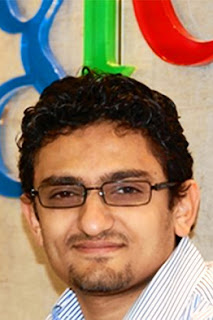Wael Ghonim rose to prominence for organizing opposition to President Hosni Mubarak's incumbent Egyptian administration. His rise to star status begins with the death of Khaled Said, allegedly due to police brutality, on June 6, 2010. In response to the death, Ghonim created an Arabic language Facebook page whose title is translated "My Name is Khaled Said." Though this page was shut down by Facebook, another quickly sprang up in its place-- "We are All Khaled Said." This was the page that, on January 15th, announced the January 25th Tahrir Square protest.
Ghonim attended the protests which lasted for several days. He tweeted often throughout the 26th and 27th of January before the government shut down the Internet and cell networks. His tweets took on both a defiant and increasingly ominous tone.
From January 27th: "We want Facebook Twitter & SMS back. Blocking free speech is a crime."
Then: "Pray for Egypt. Very worried as it seems that government is planning a war crime tomorrow against people. We are all ready to die."
Wael Ghonim disappeared later that day.
 |
| Wael Ghonim |
The Wall Street Journal reported yesterday that Ghonim was released from government detention. Today he gave a speech to the protesters who have filled Tahrir Square for the past two weeks. His release has become a rallying point for the opposition, and Ghonim himself has become an unofficial spokesman for the movement. Ghonim's rise to fame isn't shocking in its conclusion but rather in its humble beginning.
Perhaps the single event most responsible for Ghonim's current trajectory is his creation of the Khaled Said Facebook page. Let that sink in--he started a Facebook page that so threatened the Egyptian government they decided to detain an employee of one of the most powerful companies in the world. They must have known that the Western press would milk this story for days (it quickly became the most popular article on the Wall Street Journal's website and appeared on other news outlets). Using only Facebook, Twitter, and a BlackBerry, he so threatened a national government that they detained him at great cost to their credibility.
As might be expected from a Googler, Ghonim both used social media to great effect and had great faith in its power. On January 26th, he tweeted, "I said 1year ago that Internet will change the political scene in Egypt and some friends made fun of me :)" Nobody, least of all President Mubarak, seems to be making fun anymore.
I remember a time when MySpace, Facebook's precursor, was "just a music sharing site." I remember when Facebook was "just a place to show off pictures of the weekend." And I remember when Twitter was "just your Facebook status." These attitudes (some of which were mine) cannot persist in a world where governments are toppled by 140 character blog posts. Perhaps Ghonim, responding to this sentiment, put it most concisely at 5:23 PM on January 26th, "Jan25 proved you wrong. Revolution can be a Facebook event that is liked, shared & tweeted."

Well put. While I find the detention of Mr. Ghonim by the Egyptian government to be deplorable, I do stand by my earlier comment made about the internet blackout in Egypt.
ReplyDeleteThe point I had made (thoroughly misinterpreted), was simply in contention to the fact that the post claimed that "nobody who supports freedom of speech or the right to a free democratic society can condone this internet blackout."
My point was simply that there are cases in which a person who supports freedom of speech can support an internet blackout. Though I'm certainly not an expert on Egyptian law, I'd imagine that it was well within the laws of their country to suspend that form of speech in order to prevent violent uprisings.
While trying not to take a side one way or another, I'm simply claiming that it's not unreasonable to be a proponent of free speech and also support internet blackouts in some instances.